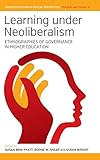Learning Under Neoliberalism : Ethnographies of Governance in Higher Education / ed. by Susan B. Hyatt, Susan Wright, Boone W. Shear.
Material type: TextSeries: Higher Education in Critical Perspective: Practices and Policies ; 1Publisher: New York ; Oxford : Berghahn Books, [2015]Copyright date: ©2015Description: 1 online resource (228 p.)Content type:
TextSeries: Higher Education in Critical Perspective: Practices and Policies ; 1Publisher: New York ; Oxford : Berghahn Books, [2015]Copyright date: ©2015Description: 1 online resource (228 p.)Content type: - 9781782385950
- 9781782385967
- 378.1/01 23
- LC171 .L43 2015
- online - DeGruyter
| Item type | Current library | Call number | URL | Status | Notes | Barcode | |
|---|---|---|---|---|---|---|---|
 eBook
eBook
|
Biblioteca "Angelicum" Pont. Univ. S.Tommaso d'Aquino Nuvola online | online - DeGruyter (Browse shelf(Opens below)) | Online access | Not for loan (Accesso limitato) | Accesso per gli utenti autorizzati / Access for authorized users | (dgr)9781782385967 |
Frontmatter -- Contents -- Acknowledgements -- Introduction: higher education, engaged anthropology and hegemonic struggle -- CHAPTER 1 ‘After neoliberalism’? The reform of New Zealand’s university system -- CHAPTER 2 Using ethnographic methods to understand universities and neoliberal development in North Central Philadelphia -- CHAPTER 3 To market, to market to buy a . . . middle-class life? Insecurity, anxiety and neoliberal education in Michigan -- CHAPTER 4 Reading neoliberalism at the university -- CHAPTER 5 So many strategies, so little time . . . making universities modern -- CHAPTER 6 Constructing fear in academia: neoliberal practices at a public college -- CHAPTER 7 Autonomy and control: Danish university reform in the context of modern governance -- Afterword -- Index
restricted access online access with authorization star
http://purl.org/coar/access_right/c_16ec
As part of the neoliberal trends toward public-private partnerships, universities all over the world have forged more intimate relationships with corporate interests and more closely resemble for-profit corporations in both structure and practice. These transformations, accompanied by new forms of governance, produce new subject-positions among faculty and students and enable new approaches to teaching, curricula, research, and everyday practices. The contributors to this volume use ethnographic methods to investigate the multi-faceted impacts of neoliberal restructuring, while reporting on their own pedagogical responses, at universities in the United States, Europe, and New Zealand.
Mode of access: Internet via World Wide Web.
In English.
Description based on online resource; title from PDF title page (publisher's Web site, viewed 25. Jun 2024)


